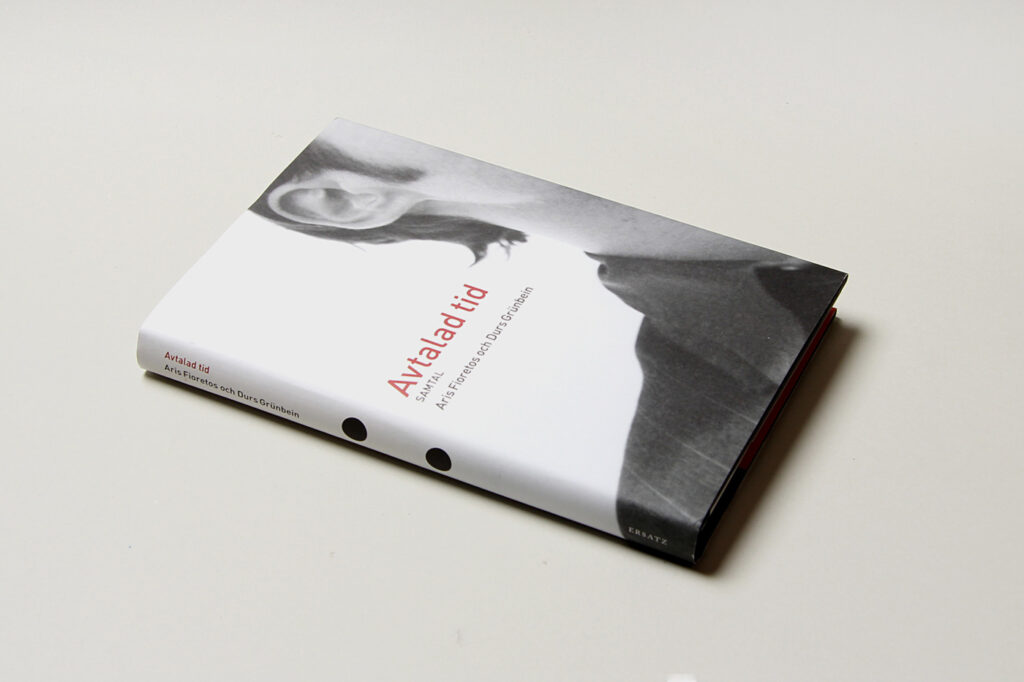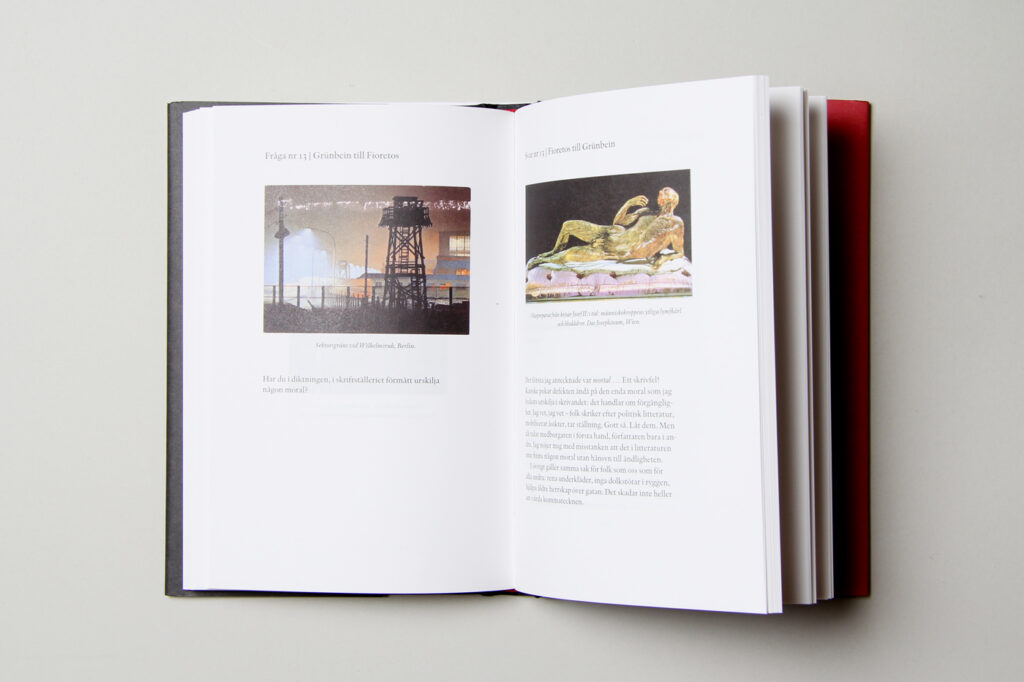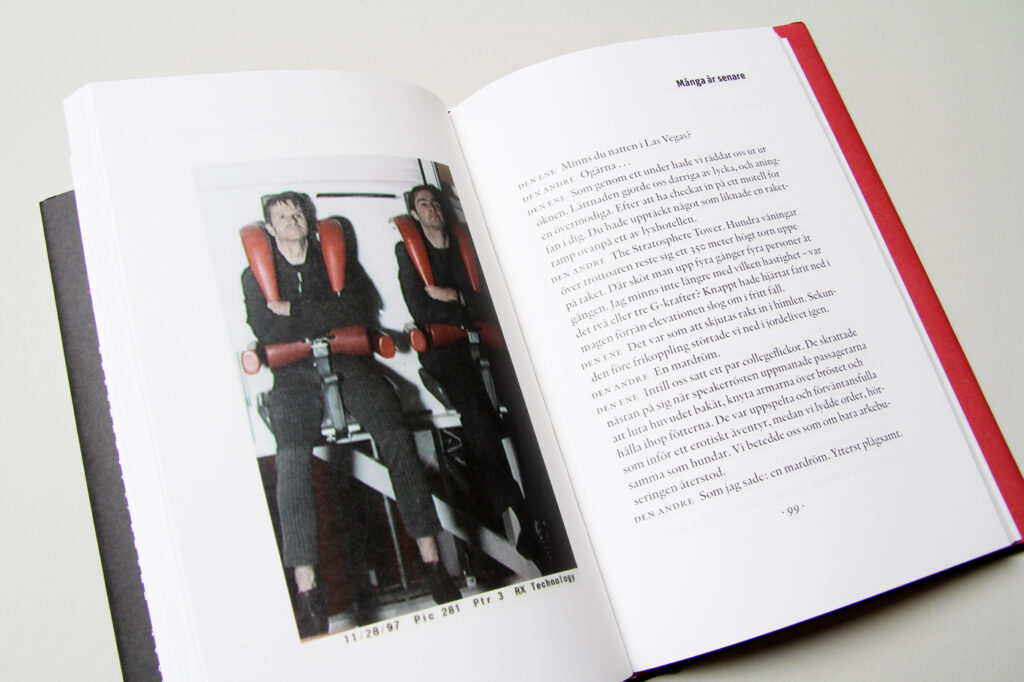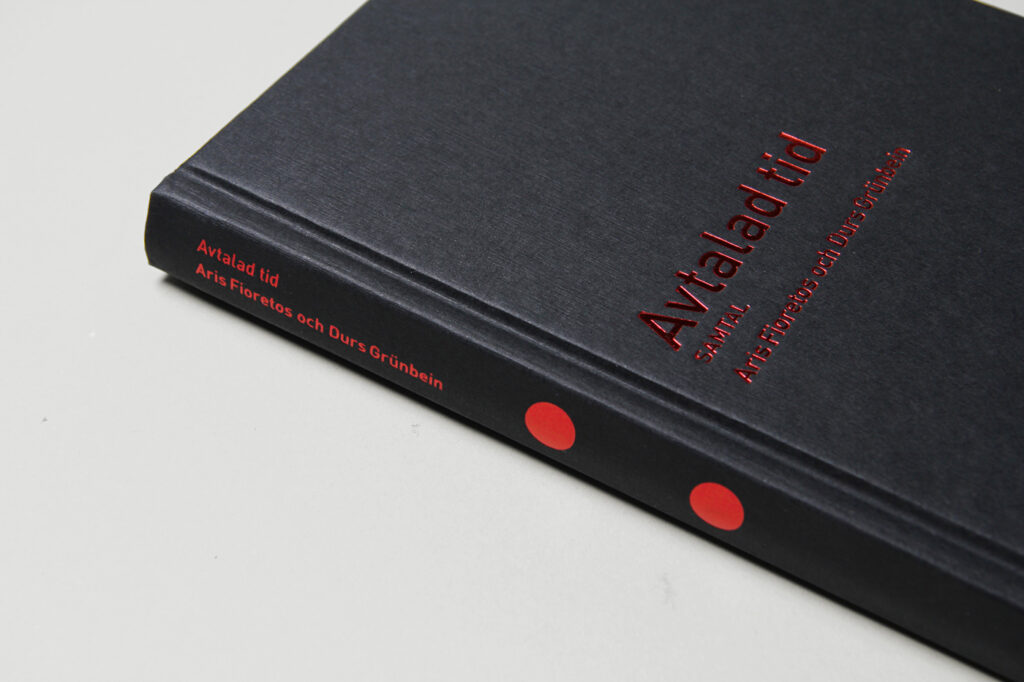




Avtalad tid
(Appointments)
Information · Cover · Foreword · Reviews
Information
Conversations · With Durs Grünbein · Swedish Translation: Wera Minth · From German · Stockholm: Ersatz, 2012, 224 pages, many photos · Cover: Håkan Liljemärker · Cover photo: Thomas Florschuetz, 1995 · ISBN: 978-91-86437-65-7
Cover
Over a period of nearly twenty years, Aris Fioretos and Durs Grünbein have arranged meetings with each other — in the television tower at Alexanderplatz on one occasion, among the sand dunes of the Mojave Desert on another. In this book they salvage the remnants of those meetings. Five rambling conversations, in which they ponder dogs’ games with bones and the value of money, but also get drunk in a deserted New York and dream of flying fish while on the ferry to Drottningholm. Every now and then they even show their hand, exchanging memories from their earliest encounter with letters — the beginning of the great literary adventure.
When they’re unable to meet, the friends send each other postcards instead. Thus a series of questions and answers are added as time passes, helping them fill in the broadest gaps in their knowledge about each other.
»Your first experience of the eroticism of language?«
»A sinister memory — brace yourself . . .«
*
Aris Fioretos has published about a dozen novels and essays since his debut in 1991. His most recent is the prose work Halva Solen (Half the Sun, 2012). He has received numerous awards and prizes both in Sweden and abroad, and has translated writers including Friedrich Hölderlin, Vladimir Nabokov and Walter Serner into Swedish. He lives and works in Berlin and Stockholm.
Durs Grünbein has been living in Berlin since 1986. He debuted in 1988 and has since published a large number of poetry collections, books of essays and interpretations of ancient texts. He is the recipient of a series of renowned prizes, and has been translated into twenty-odd languages. Ersatz Förlag has published four of his books, most recently Interiör med uggla (Interior with Owl), a selection of poems.
Foreword
A Swede and a German, both supporters of the printed word, meet a few years after the fall of the Wall. In the manner of stray dogs, they are immediately drawn to exploring each other’s territory. They pay each other visits and discreetly sniff around in strange corners. As yet, neither imagines that the friendship will lead to a series of meetings — each time in a new place: first in reunited Berlin, then in the western United States, the new German capital and New York after the World Trade Center attacks, and finally on a mild spring day in Stockholm.
Since they are frequent travellers in these historically troubled times, they soon learn to appreciate the calm exchange. Their joy at being reunited often leads the conversations astray. Later, they will regard these digressions as an exercise in treading water, in consciously indulging the twistedness of words and calling it meanderings. They carry on in this way for nearly twenty years, with some shorter and some longer interruptions. Certain get-togethers are recorded, others live a temporary afterlife in scattered notes; much is lost. Five conversations are finally salvaged from the debris. A meagre return if one considers the intensity of the meetings.
As is customary in life, they both evade at length the most burning issues. Altogether too private queries are omitted out of discretion. Both are amply furnished with what they have learned of each other from the books published at regular intervals. Every now and then they try to feed spontaneous curiosity with postcards. The only rule they settle on is not to bore each other with holiday greetings or travelogue. Instead they devote themselves to a playful ritual. Thus are added questions and answers that help them bridge the broadest gaps in their knowledge about each other.
Pages 7–8.
Reviews
“The two friends have a great deal to talk about, with literature at the core of the friendship. Their conversations move between personal experiences, European history and profound analyses of writing.” — Curt Bladh, Gefle Dagblad
“[N]o small talk here; all intellectual cylinders are well tuned and always revving in the red zone.” — Per Helge, Västmanlands Tidning
“Here, then, we have two successful intellectuals in their prime, from different backgrounds: Fioretos, who inhabits a kind of no-man’s land between Sweden, Austria and Greece, and Grünbein, who grew up in the DDR with all the implications that brings . . . The result is a text containing both the comical and the deeply serious, opening in Berlin in 1995 and closing in Stockholm in 2011. Nothing in their discussion seems indisposed to the soaring of thought in this meandering conversation. Passing fancies, free associations and assumptions based more on the imagination than on firm scientific foundations rub shoulders with indisputable experience of the state of the world then and now.” — Bo W. Jonsson, Borås Tidningar
“The world is silly, absurd, idiotic — Fioretos and Grünbein try to step outside of it and think bigger, but are forever aware that the greatest thoughts risk being dragged down by the pettiness of reality.” — Elise Karlsson, Dagens Nyheter
“The level of this intellectual exchange is the highest imaginable. Its bar is set by none lesser than Jacques Derrida, the French philosopher. Both Fioretos and Grünbein are part of a continental European philosophical tradition. What they achieve here are brief dips into what could be called a current sense of contemporaneity. One is among the most esteemed of Germany’s poets, the other a novelist at the front line of today’s Swedish literature. They meet as evenly matched players and are in the same cerebral weight class. The first time in Berlin in 1995, before they bid goodbye in May 2011 aboard a Mälar boat that has just cast off from Drottningholm. It is a joy to partake of their elegant, often witty conversation.” — Bo-Ingvar Kollberg, Upsala Nya Tidning
“In five witty dialogues, writers and essayists Grünbein and Fioretos invite us to follow their culture-semiotic wanderings. In brilliant analyses and with a quick wit they deal, at the appointed time, with artistic and linguistic, literary and philosophical questions, literally laying the world at their feet from the TV tower by Berlin’s Alexanderplatz, a hotel in Las Vegas or an archipelago boat in Stockholm. A cerebrally stimulating display of the elusive art of thinking and conversing.” — Martin Lagerholm, Kristianstadsbladet
“We often sense an ironic twinkle in the eye, but there is a genuine foundation for the book: a serious and knowledgeable discussion about our epoch, such as it has played itself out since the second world war.” — Blogger Thomas Nydahl, nydahlsoccident.blogspot.de
“I’m flipping out.” — Tina Persson, Smålands-Posten